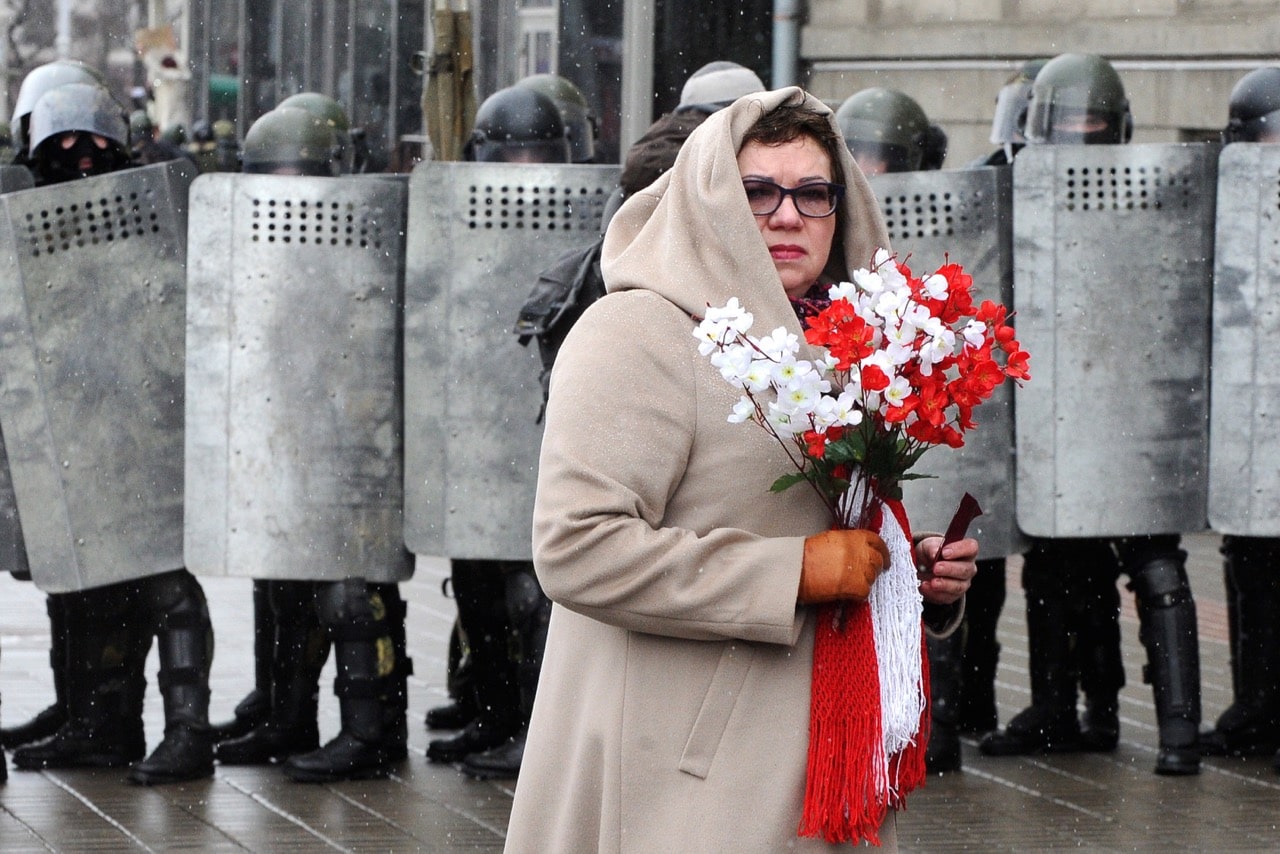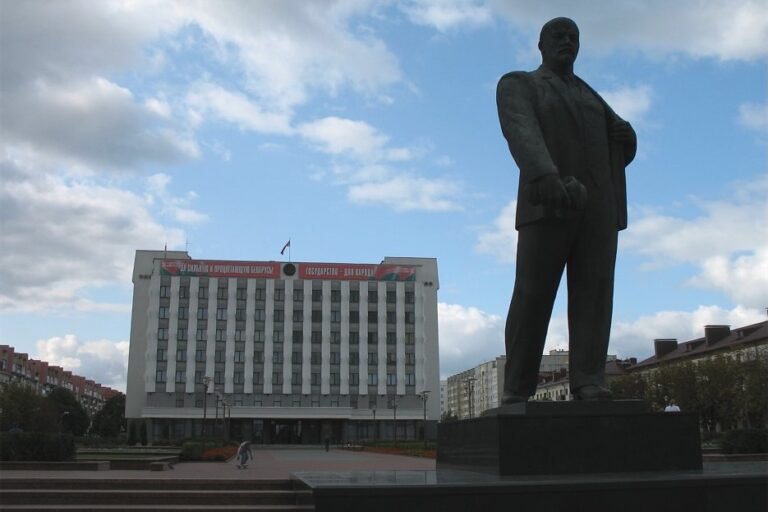Despite signs in 2016 that Belarus might be easing up on harassing journalists, 2017 saw a worsening of the media freedom climate.
This statement was originally published on ipi.media on 13 March 2018.
In just over a month in Belarus, which is well-known for muzzling free speech and harassing independent media, the popular independent website Charter ’97 was blocked, a Belsat TV cameraman was beaten by police and a reporter had his home searched following an article on police brutality.
These, however, are but some of the latest cases in a year marked by a radical worsening in Belarus’s press freedom situation.
In 2016, it seemed that Belarusian authorities had eased up on harassing journalists. Comparatively few reporters were fined, arrested or subjected to violence that year.
Then came spring 2017.
Around that time, President Aleksandar Lukashenka introduced a tax on those who are not employed full-time in an attempt to boost the country’s faltering, Soviet-era economy. Rarely seen anti-government protests filled streets and town squares across the country. As part of an attempt to quell the effect of the protests, authorities launched a media crackdown.
101 journalists were detained in 2017, according to the Belarusian Association of Journalists (BAJ), most of them during protests in March and April. 69 journalists were fined for working “illegally” in 2017, more than in the years 2014 to 2016 combined.
Many of those detained or fined were freelancers working for the Polish-funded independent television channel Belsat TV.
“Our journalists became prey for the Belarusian authorities”, Agnieszka Romaszewska-Guzy, the director of Belsat TV, told the International Press Institute (IPI) in a recent interview.
The situation is not getting any easier. Since the beginning of 2018, Belsat TV has already been involved in 10 legal proceedings in Belarus, Romaszewska said.
Freelancers constantly targeted
The everyday life of independent journalists in Belarus is full of obstacles. The most notable ones, Belarusian journalists say, are an “absurd” mass media law, a biased judicial system and the repressive regime of President Lukashenka, who has ruled the country with an iron fist since 1994. Add in the generalized crisis of the newspaper industry and decreasing enthusiasm from Western partners to fund independent media in Belarus and one can understand why Belarusian journalists do not entertain high hopes for a quick fix in the media situation.
Televisions remains the main source of news in Belarus. Nine basic channels are provided free to the public. This set is limited to state-owned TV channels, which follow the line of the Lukashenka regime, and Russian networks that concentrate on getting the Russian view through to Belarusians.
“According to our previous minister of information, journalists who work for state-owned media are state officials”, Michal Janczuk, deputy chair of the BAJ, said in an interview with IPI. “This describes the position of Belarusian journalists in state-controlled media.”‘
The only independent TV channel in Belarus is the satellite and online broadcaster Belsat TV, which is funded and operated from Poland. While Belsat TV’s reporting is mainly done in Belarus, the material is edited in Poland and broadcast back to Belarus.
Foreign-based media targeting a Belarusian audience are extremely important for the country, Janczuk, who is himself a former Belsat TV journalist, emphasized.
“Belsat TV is the only alternative to Minsk and Kremlin propaganda [in television]”, he said. “Foreign-based media are free to write about anything they want, as openly as they want.”
Established as a joint project of Poland’s Ministry of Foreign Affairs and the Polish public broadcaster TVP in 2007, the channel has faced numerous challenges in Belarus. A major problem is that Belarus’s media law does not recognize freelancers cooperating with foreign mass media as journalists. Most of Belsat TV’s journalists in Belarus are freelancers and are systematically denied accreditation by the authorities. Journalists who are caught working for foreign-based media without accreditation can be fined or detained for “illegal production and distribution of mass media”. State institutions – which are not especially transparent to begin with – also routinely refuse to provide information to non-accredited journalists.
Media advocates, including the Office of the Representative on Freedom of the Media of the Organization for Security and Co-operation in Europe (OSCE), have repeatedly called for a legal reform. “Freelance journalists should be able to work as freely as journalists employed with registered media outlets”, the Representative said in a 2014 statement on Belarus.
Belsat TV also faces the “absurd” conundrum that Belarusian law bars accrediting journalists who have previously worked without authorization.
“In Belarus, you can’t get accreditation if you have been punished before”, Romaszewska explains. “And since almost all our journalists have been punished for working without accreditation, they can’t get it. So it is a vicious circle.”
The fines for working without accreditation amount to around 300 to 400 euros per case. BAJ pays the fines for its members, who are mainly independent journalists working outside of state media.
“Last year we paid almost 30,000 euros worth of fines in total”, Janczuk said. “Already in 2018, we have almost reached 3,000 euros, which is radically more than last year this time.”
The BAJ faces its own challenges. The association’s membership cards are no longer accepted as press cards. Its legal department is now barred from helping journalists in court, restricting it to providing informal support to journalists in legal trouble. Still, with around 1,200 members, the BAJ is financially sustainable and has the means to clout to stand up for journalists’ rights, making it an invaluble voice in Belarus’s media landscape.
In addition to the BAJ, there is a journalists’ union for state-owned media workers in Belarus. Despite several attempts to build dialogue between the two associations, including with help from European partners, the journalistic community in Belarus remains deeply divided. “Whenever we have meetings outside the country, they (union members) stand for dialogue and media reform”, Janczuk said. “But when they get back to their desks in Belarus, they go back to propaganda reporting.”
Self-censoring allows moderate critique
There are a few strong commercial non-state media outlets in Belarus. Though they are powerful players against the lavishly funded government sources, their ability to report critically has limits.
For example, the most popular news portal in Belarus, Tut.by, is perceived as “quite honest” in its reporting. But it remains dependant on advertising money, which can lead to self-censorship and extra caution.
“If there is a scandal, Tut.by usually waits a couple of days before it publishes the news, so it won’t be the first one”, Janczuk noted.



